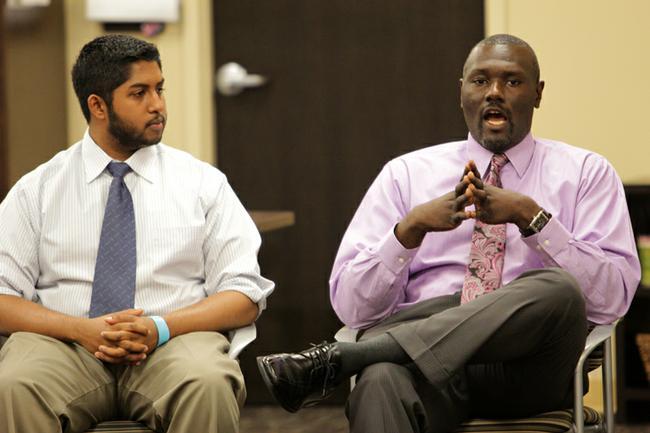Prompted by the recent Trayvon Martin shooting, the Missouri Students Association hosted an event called “Beyond the Hoodie” on Wednesday.
Held in the Women’s Center, “Beyond the Hoodie” facilitated open dialogue about how to identify and stop biases and prejudices on campus and in the community.
Lakeisha Williams, outgoing chairwoman of the MSA Multicultural Issues committee, moderated the event, which featured a panel of students, professors, faculty and community members. MSA wanted students from all races and viewpoints to learn from and contribute to the dialogue, Williams said.
“What’s really hard with topics like this is that you end up drawing a crowd that already has a pretty conscious mind not to be stereotypical in the first place,” Williams said. “We really want to reach students who don’t have a great diversity in maybe their choice of friends so that they can start learning about others.”
Williams said she does not face huge instances of discrimination in her personal life but receives some remarks from people that stem from preconceived notions.
“People will make the comment, ‘Wow, you are so articulate,’” Williams said. “They always say it in a surprised manner, too, like it’s not the norm. I always think, ‘Well, why wouldn’t I be articulate?’”
MSA President Xavier Billingsley, who had the idea for the event, said though students can’t change prejudice on campus in one day, change can start with one person.
“It’s great to want to fight (prejudice), but first we have to learn how to fix it,” Billingsley said. “MSA is really about finding solutions, so that was the point of this dialogue.”
Muslim Student Organizations Vice President Mahir Khan gave a student perspective on a panel featuring mostly adult professionals. At one point, he pulled out a scarf he likes to wear when the weather is cold. He said whenever he wears it, people think he looks like a terrorist, paralleling how Martin’s hoodie could make him look like a criminal.
“I don’t want to sit back and think people should feel bad for me,” Khan said. “That’s the worst thing you can do, to fishbowl yourself and be on the inside looking out. You just can’t consider yourself a victim.”
Khan also gave an anecdote about the cultural shock he experienced in sixth grade. He went from attending an all-Muslim school to Gentry Middle School, where there are students of all races.
“My parents always told me that it was a transition for me,” Khan said. “I knew I was representing not just myself or my family. I am representing my entire religion. I want people to know that I’m not a bad guy.”
Sophomore and Maneater staff member Jessie Lueck, who attended the event after seeing an advertisement on Facebook, realized although they would be talking about Martin, the dialogue would be more general and touch issues about gender and religion as well as race.
“These questions and issues are something we are faced with every day,” Lueck said. “Learning how to handle situations and listen effectively is super important for any person involved in our community.”
A student can report any instances of prejudice through a bias incident report reviewed by the Chancellor’s Diversity Initiative, Williams said. Many student organizations also provide a safe place for students who might feel bias because of how they are identified.








